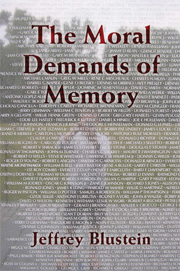4 - Ethics, Truth, and Collective Memory
Published online by Cambridge University Press: 05 June 2012
Summary
Modern shared memory is located between the push and pull of two poles: history and myth.
– Avishai Margalit, The Ethics of MemoryMEMORY AND HISTORY/HISTORY AND MYTH
“Memory,” says Kerwin Lee Klein, “is replacing old favorites – nature, culture, language – as the word most commonly paired with history” in academic and to some extent in popular discourse. Memory, more precisely collective or social memory not individual memory, has become a preoccupation of contemporary historiography. However, to say that memory is now commonly paired with history is a simple way of conveying a rather complex truth because there is considerable variation in how these terms are understood and in the point of the pairing. Here are some of the claims about collective memory, history, and their relationship that those who link history with memory make.
Historians Pierre Nora and Yosef Yerushalmi, two of the fathers of the current “memory boom” in historical studies, pair “memory” and “history” in order to emphasize their opposition. “Real memory,” says Nora, has an “affective and magical” quality that distinguishes it from the dispassionate analytic approach of history. Collective memory, in its true sense, has largely disappeared from the world and been replaced by new kinds of memory, by what he calls “archive-memory” and “duty-memory.” Others want to criticize, as naïve, views that give preference to memory over history on the grounds that memory is somehow more authentic or truer to the past than the alleged contrivances and manipulations of history.
- Type
- Chapter
- Information
- The Moral Demands of Memory , pp. 176 - 239Publisher: Cambridge University PressPrint publication year: 2008

